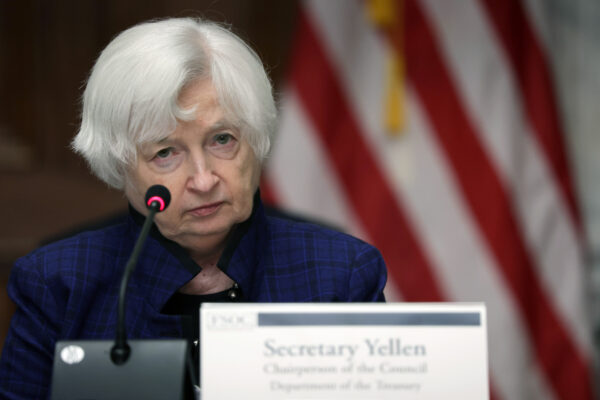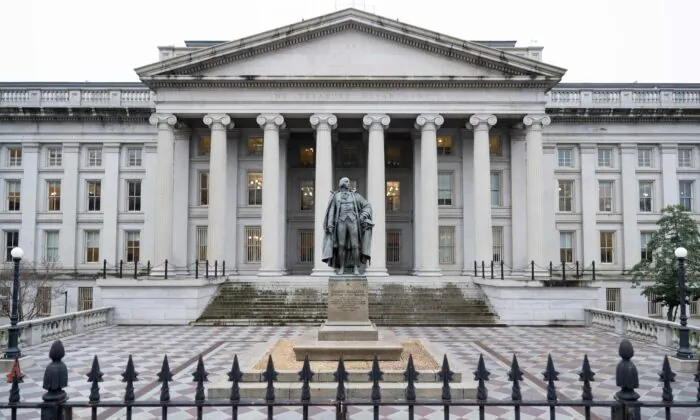By Andrew Moran
The U.S. government could avoid defaulting on its debt through July if the Treasury Department can receive enough revenue in June, according to the Congressional Budget Office (CBO).
The agency stated in its updated guidance that if the government can collect enough tax revenue and the Treasury continues employing its extraordinary measures, it “will probably allow the government to continue financing operations through at least the end of July.
But Washington still faces a “significant risk” of defaulting on its debt in the first two weeks of June, with CBO officials warning that the federal government may no longer be able to cover all its obligations after the middle of June.
In addition, according to the CBO, the uncertainty will persist for the rest of May.
“The extent to which the government will be able to fund the government’s ongoing operations will remain uncertain throughout May, even if the Treasury ultimately runs out of funds in early June,” the nonpartisan watchdog said in the latest report “That uncertainty exists because the timing and amount of revenue collections and outlays over the intervening weeks could differ from CBO’s projections.”
How the Treasury would respond if the U.S. government runs out of money and the extraordinary measures are no longer sufficient remains unclear. Government payments, such as federal grants, paychecks for federal workers, and food stamps, could largely be affected or postponed.

Should the Treasury default on the debt or delay payments, the CBO warned that “those actions could result in distress in credit markets, disruptions in economic activity and rapid increases in borrowing rates for the Treasury.”
Treasury Secretary Janet Yellen echoed these comments, warning that a failure to raise the debt ceiling “really impairs our credit rating.”
“We have to default on some obligation, whether it’s Treasurys or payments to Social Security recipients,” Yellen told Bloomberg TV on May 12. “That’s something America hasn’t done since 1789. And we shouldn’t start now. So we’ve not discussed what to do.”
“If Congress doesn’t raise the debt ceiling, we face economic and financial catastrophe one way or the other,” she added.
During the debt-ceiling debate in 2011, Standard & Poor’s downgraded the U.S. credit rating for the first time ever, from AAA to AA+.
A meeting between President Joe Biden and House Speaker Kevin McCarthy (R-Calif.) had been scheduled for May 12, but it was postponed to next week because there was not “enough progress for the leaders to get back together.”
The president took to Twitter, accusing “MAGA House Republicans” of threatening to default “unless we give in to their demands.
“Their wish list could cut thousands of jobs—including wildland firefighters, National Park rangers, and workers who regulate water quality,” Biden wrote. “It doesn’t work for families.”
Press Secretary Karine Jean-Pierre called it “a manufactured crisis,” adding that there is “a lot of urgency” to resolve this “potential devastation” for the economy and American households.
“This is an incredibly important point that we’re in that’s why the [resident has used his bully pulpit for the past several months since February saying, Congress needs to act, Congress needs to move forward, Congress needs to do their constitutional duty. So we’re going to continue to do that,” Jean-Pierre told reporters from the White House.
Update to the Budget Deficit
In a separate report, the CBO also updated its 2023 projection for the federal budget deficit, increasing it to $1.5 trillion. However, it stated that the “estimate is subject to considerable uncertainty, though, in part because of a recent shortfall in tax revenues.”
It also projects that the budget deficit will rise to $2.9 trillion by 2033. The report further revised the cumulative deficit through 2033 upward by $51 billion, to $20.314 trillion.
In April, the U.S. government reported a budget surplus of $176 billion, down from $308 billion at the same time a year ago, according to the Treasury’s latest Monthly Treasury Statement. This was also below the consensus estimate of $235 billion. For the first seven months of the current fiscal year, the federal deficit stands at $925 billion.
The Committee for a Responsible Federal Budget (CRFB) confirmed that the 12-month rolling deficit (from May 2022 to April 2023) is $1.942 trillion.
Maya MacGuineas, the CRFB president, agreed that it is necessary to raise the debt limit immediately “without drama and without any threat of default.” But President Joe Biden and lawmakers must “enact some budget savings and reforms.”
“Inflation and interest rates are too high, and our fiscal path is unsustainable. We need over $8 trillion of 10-year deficit reduction just to hold debt at its current share of the economy,” she said in a statement.
“With inflation surging and debt approaching a record share of the economy, there is little time to waste. And with the debt limit deadline well in sight, lawmakers must act as soon as possible to make sure the country can pay its bills. Default cannot be an option.”






